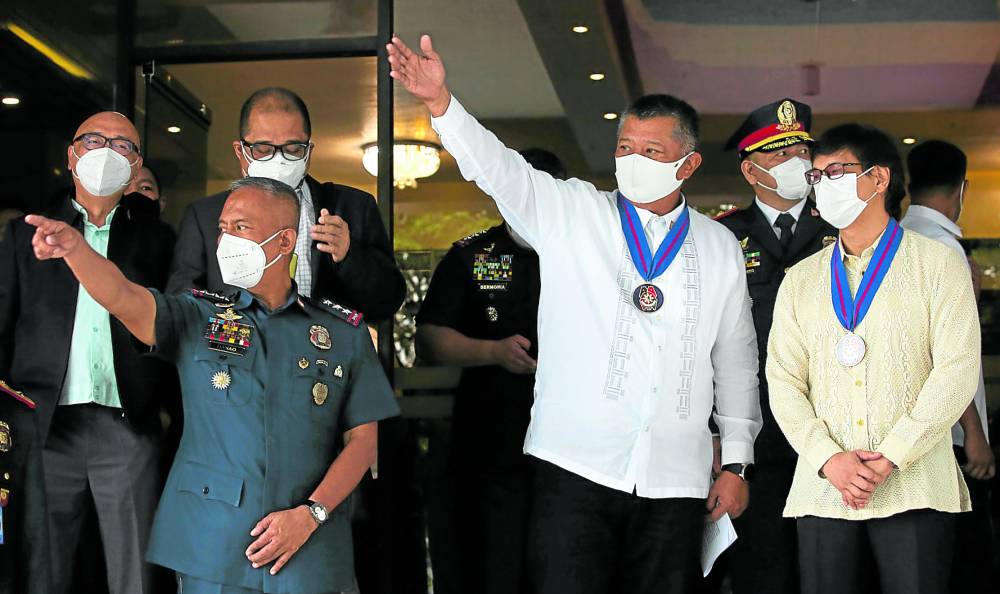
NEEDS IMPROVEMENT Interior Secretary Benjamin Abalos Jr. and Justice Secretary Jesus Crispin Remulla highlight the need to train police investigators to improve the conviction rate of drug-related cases at a joint press conference on July 21 in Camp Crame, Quezon City. —LYN RILLON
The Department of the Interior and Local Government (DILG) and the Department of Justice (DOJ) have ordered a review of the qualifications of police investigators in the country, citing the dismal conviction rate of crime suspects arrested.
In a press conference on Thursday at the Philippine National Police headquarters in Camp Crame, Interior Secretary Benjamin Abalos Jr. and Justice Secretary Jesus Crispin Remulla cited the need for capable police investigators as one of the requisites for criminal cases lodged in court to lead into conviction, and improve the criminal justice system in the country.
According to Remulla, the current conviction rate for criminal cases filed in courts stood at “less than 25 percent.”
“This means that we are not really getting a passing grade. This is not a standard that we can live with for the next few years, so we have to change it drastically,” the justice secretary said.
“When the conviction rate is very low, the certainty of punishment goes down. Then the criminals have a heyday, [because they have an] easy time with the law,” Remulla added.
Training lack
Citing data from 2016 to July 2022, Abalos said that only 21 percent or 62,061 of the 291,393 drug-related cases led to conviction. The majority of these cases at 223,579 or 77 percent remained pending before different courts, while the rest were dismissed or led to acquittal.
He attributed this dismal performance to the lack of training in the judicial process of investigators-on-case, particularly on the police’s failure to follow the chain of custody of evidence under the law due to lack of witnesses.
Under Section 21 of the Comprehensive and Dangerous Drugs Act of 2002, inventory of the seized drugs should be done in the presence of a representative from the media or the DOJ, and any elected public official, usually from the barangay.
Of the 225,000 workforce of the PNP, 10 percent or 22,774 are police investigators. However, of these investigators, only 123 are law graduates, according to Abalos.
He said the partnership between the DILG and the DOJ would be a “sort of mentorship,” as they aim to “retrain” PNP investigators in surveillance, effecting arrest, preserving the scene of the crime, and processing of evidence.
“All of these have to be restudied, re-inculcated. And of course inject it into the system in a more widespread manner. Meaning to say, every police station should have that skill already from the very start,” Remulla said.
“We will have a reassessment of what’s happening on the ground. We will supplement what [the police investigators] already have,” said Abalos, who sits as the chair of the National Police Commission (Napolcom), which is responsible for the administration and control of the PNP.
“We need to review if these police investigators are qualified or not,” he added.
Abalos said the role of police investigators in the justice system was “very very important.”
Qualifications
“This single important act done by an investigator would determine the result not only at the prosecutor level, but likewise, if the case would be for conviction or acquittal in court,” he added.
Remulla agreed, saying the police were the “main pillar of the enforcement of the law.”
“If the police are faring well, then I don’t think we will have a problem with peace and order, and we will have a better country in the end,” he said.
The Napolcom defines a police investigator as someone “tasked to investigate the criminal cases with utmost care and accuracy, collect data and other pertinent pieces of evidence to support crime theories leading to the identification and apprehension of the criminal, with the end view of proving his guilt before the court.”
The duties and responsibilities of police investigators are spelled out in the PNP Investigator’s Handbook for New Normal, which was updated in 2020 in view of the coronavirus pandemic.
Police investigators are assigned at the station and regional level, as well as in the Criminal Investigation and Detection Group, Anti-Cybercrime Group, Women and Children’s Protection Center and other police units.
Only select police officers who have undergone training and reached a certain educational attainment may become certified police investigators.
They must at least have a rank of corporal, with five years in the service and some experience as an investigator-on-case.
They also must have completed the Criminal Investigation Course and Criminal Investigation and Detective Development Course offered by the School for Investigation and Detective Development of the PNP-Directorate for Investigation and Detective Management.
A police investigator can be promoted to a police detective or a case manager.
Previous Napolcom administrations took steps to professionalize and enhance the proficiency of the PNP’s field investigators. In 2018, for example, it provided incentives for police investigators by adding a 5-percent “specialist pay” on top of their regular monthly salary.
The latest policy change was made through Napolcom Memorandum Circular (MC) No. 2020-006 signed by then Interior Secretary Eduardo Año. It relaxed the educational eligibility rules set by MC No. 2013-002 that was issued during the time of Secretary Mar Roxas.
Under the 2013 circular, investigators who are commissioned officers (with the rank of police lieutenant to police general), detectives and case managers must be licensed criminologists, with a master’s degree in criminology or a law degree.